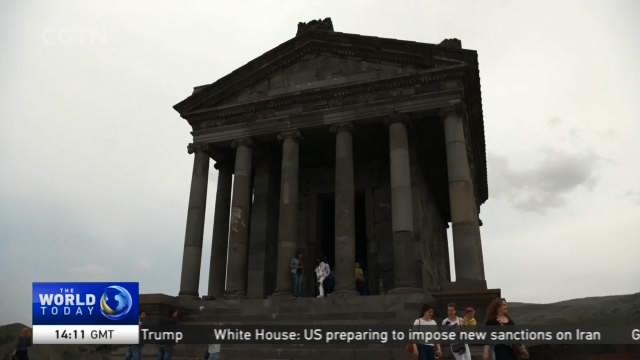
22:27, 10-May-2018
Armenian Protests: Villagers in countryside show resilience to hardships
02:56

Armenia has made headlines around the world in a last few weeks, because of the massive protests in the capital Yerevan that toppled the government. Most of the protesters were young and from urban areas. But how are people in the villages reacting to the dramatic political changes. Our correspondent Aljosa Milenkovic embarked on a road trip through the Armenian countryside fo find out.
More than 2,000 years ago, ancient Greeks constructed this temple to honor their gods.
Greeks have not been around for ages but the village of Garni remains with around 7,000 Armenians.
They make living out of tourists attracted by this ancient monument and some agriculture products.
Twenty-eight-year-old Vardan Arakelyan is one of the locals in the village. He went to school to learn to be a hairdresser. When he wanted to continue his education, he was asked to give bribes to be accepted at the university.
Instead, he stayed in Garni and earned a living as a local hairdresser and by selling fruit and vegetables from his small garden.
He has high hopes amid the political changes in the country.
VARDAN ARAKELYAN GARNI RESIDENT "I hope that like every honest man, Pashinyan would see that thousands of people are placing their hopes into him and he's conscience will kick in and he’ll follow the people's wishes and give them what they want. If that doesn't happen, nothing good can happen after, and every man would have to take care for himself."
Just few streets away, we met 67-years-old former arts teacher Ruben Babayan and his wife Ruzan Khalatyan.
They've lived entire life in Garni. He spends his retirement days in his arts studio painting and enjoying beautiful scenery just outside of his windows.
And this more than 100 –years- old house is his pride and connection with his roots, since it was built by his great grandparents.
Ruben also had his peace of mind about what happen in Yerevan and what he thinks the new government will have to do.
RUBEN BABAYAN GARNI ARTIST "I think that changes won't happen immediately. A lot of things need to be done. It can take 10 or 20 years, but I'm certain that we've changed our path, meaning that the wealth that went into the pockets of the of those in power, will not end up there any more. And now, new authorities need to achieve goals they've set. They need to have constructive, pro-national policies. And I think that'll happen."
ALJOSA MILENKOVIC GARNI "For thousands of years, this nation survived ups and downs, occupations and wars, troubles and triumphs. People here see the latest political turmoil as just a small stitch in the big carpet of their history. That's why the composed resilience to hardships was so clearly seen on the faces of villagers here. Aljosa Milenkovic, CGTN, Garni."

SITEMAP
Copyright © 2018 CGTN. Beijing ICP prepared NO.16065310-3
Copyright © 2018 CGTN. Beijing ICP prepared NO.16065310-3